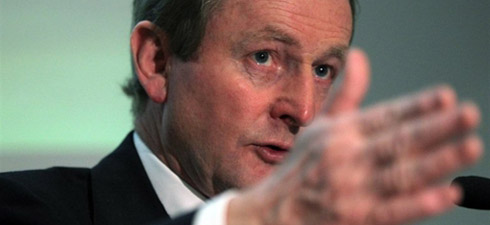Whatever sceptics may think, the election will make at least one huge difference. Up until February 25th, there will have been no popular mandate for turning bank debt into public debt and imposing another four years of austerity. After that, unless all the polls are completely askew, there will be a popular mandate for the bank bailout, the EU-IMF deal and the cuts. Behind all the excitement of a historic changing of the guard, this is the real big event.
Come Saturday morning, like every morning after every election in the history of the State, right-of-centre establishment politics will be triumphant. Fine Gael and Fianna Fáil will have well over half the vote between them, 53 per cent according to yesterday’s Irish Times poll. More strikingly, it is precisely the same as the 53 per cent that Fine Gael and Fianna Fáil between them got in the European elections in June 2009.
Everything that has happened since then – the revelation of the abysmal depths of the banking crisis, the loss of economic sovereignty in the EU-IMF deal – has resulted in little more than a shift in support between the two right-of-centre parties that have dominated Irish politics since the foundation of the State. Leave aside the “vingince, by Jaysus!” factor in relation to Fianna Fáil, and there is nothing to trouble the seismologist. This outcome will be greeted with relief by the European Central Bank and the fiscal hawks within the EU.
It will mean that all the rage and disgust, all the cursing and fist-shaking, will have amounted to nothing very much. Internally, of course, Fianna Fáil’s worst result to date will be a big deal. But externally, where the real power now lies, it will seem that nothing of great significance has happened.
The Irish will have a new government, surely more competent and energetic than the exhausted and demoralised one that rolled over when the IMF and the ECB came to town. The new boys will be rewarded with some promises of adjustments to interest rates that will allow them to claim victory. And they will get on with the job of nationalising private debt while attempting to bring the public deficit to below 3 per cent of GDP by 2014.
From the point of view of the ECB, the Irish will be even more onside than they are now. There was always a worry that Fianna Fáil and the Greens did not have public consent for the four-year plan they signed up to. These parties, after all, took just a quarter of the vote between them in 2009. That consent is now in the process of being secured. A few small concessions may be necessary but, after Friday, it will be essentially in the bag. Read full article in Irish Times...
From London
Even EU doubts austerity is the answer
As Britain goes through its first round of massive budget cuts, its commentators are studying austerity Ireland’s case closely. “There is a degree of private incredulity among European finance ministers over whether Ireland can achieve the austerity that has been imposed upon it,” writes Will Hutton in the Observer, “– and whether it is right for the European Union to insist that the draconican plans remain unchanged.” While Ireland has committed to cutting its budget deficit by 8% of GDP by 2014 - “an experiment on a scale that no economy has suffered since the 1930s” - many doubt that Ireland will attain growth for several years. “At the World Economic Forum in Davos this year,” Hutton writes, “I ran into one leading EU finance minister who believed that the pace of deficit reduction simply had to be slowed – and that the EU had to demonstrate to the newly elected Irish government that it would be prepared to ease the pain.” After all, “The euro's credibility depends not on a member state suffering decade-long stagnation, but on offering a safe haven – albeit with disciplines – for growth and stability.”
Do you like our work?
Help multilingual European journalism to thrive, without ads or paywalls. Your one-off or regular support will keep our newsroom independent. Thank you!
















